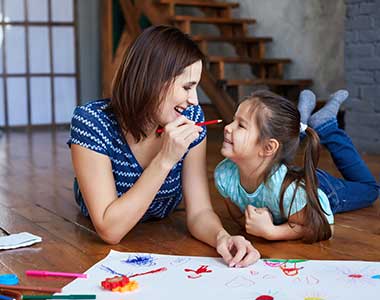Raising a Self Confident Child

Social success is critical for broader success, and resiliency research shows that children who are popular, likeable and able to resolve conflicts with others are also more likely to succeed at school, and are generally more resilient than children with less developed social skills.
Stages of Social Skills
Between 4 and 5 years old
- Co-operative play develops. Children start to play group games. Games become more complex and organized.
- 'Special' friendships begin to form.
- Learning how to play fairly and abide by rules.
- Can approach others and ask to join in with groups.
- Begins to learn to be assertive and to ask others to stop if they are being annoying.
Between 6 and 8 years old
- Learning to be a 'good winner' and a 'good loser'.
- Can empathize with others in distress and offer appropriate support.
- Learning to give and receive compliments from others.
- Conversation skills developing: how to listen to others and take turns talking etc
- Can ask an adult for support when needed.
- Negotiation skills: including others in decision-making, learning to decide together and make suggestions rather than boss others around.
- Able to say 'no' to peers when appropriate.
Between 9 and 12 years old
- Learning to speak confidently in front of a group.
- Learning to respect the opinions of others.
Teaching social skills to children
Although they do not receive the same attention in the classroom, in many ways social skills are just as important for success as academic skills. The following are some tips on how to teach social skills to children, both at school and in the home.
- Provide explicit instructions
Children often need to be given direct, explicit instructions about how to behave in specific social situations. For example, a child may need to be told that it is important to say "hello" back when somebody greets them, or to smile when approaching a child to ask to join in a game.
- Provide structured learning opportunities
Social skills cannot be taught by instruction alone. Children need ample social opportunities to develop their skills. To teach sharing, set up a co-operative activity in which children have to share a limited set of resources. To teach fair play, provide instructions on how to play fairly, then get children to play a game (e.g., snakes and ladders), during which children can be reminded of the rules. Rewards can be provided to those who played well.
- Help children to solve their own social problems
When children experience social problems, such as conflict with a friend, or rejection by a group, it is often tempting for parents to jump in and try to solve the problem for them. However, except in situations involving bullying or other unacceptable behaviour, it is generally better to assist children to solve their own social problems rather than intervening directly. This can be done by asking children to think of ways that they might be able to deal with the situation, providing feedback on their ideas, and perhaps offering some suggestions, then encouraging them to try out the best options. In this way, children can learn a sense of social mastery through finding that they can deal with a difficult situation without direct adult help.
- Provide feedback
Children are not always aware of the connection between their own behavior and its social consequences. For example, a child who hits other children is likely to soon find him or herself lacking in playmates, yet may not necessarily understand why. Adults can help children to learn to connect their own behavior with its results.
Self-confidence is your child's passport to lifetime mental health and social happiness It's the foundation of a child's well-being and the key to success as an adult. it means having a realistic understanding of one's strengths and weaknesses, enjoying the strengths and working on the problem areas. Throughout life your child will be exposed to positive influences builders and negative influences breakers. Parents can expose their child to more builders and help him work through the breakers.
- Set your child up to succeed
Helping your child develop talents and acquire skills is part of discipline. If you recognize an ability in your child that he doesn't, encourage him. Do this by giving her plenty of eye contact, touching, and focused attention.
- Give positive labels
Notice a quality that your child has and reinforce it. Use positive expectations and positive labels: “I know that you will do the right thing, you are the wise boy in the family” you can call your child: “Mr generous, or Miss Helpful…”
- Unconditional Love
When you provide your child with unconditional love, you let him know that he is accepted and forgiven no matter what happens. Unconditional love helps your child to build up more his self-confidence and to express himself more with you. It is very important for the future relationships that the child will build.
- Screen your child's friends
The child's values and self-concept are affected by persons of significance in his life— relatives, coaches, teachers, religious leaders, scout leaders, and friends. It's up to the parents to screen out those who pull down the child's character and encourage those that build it. Keep a watchful eye on your child's friendships. First, let your child choose his own friends and monitor the relationships. At the end of a play experience examine your child's feelings. Is he at peace or upset? Are the children compatible?
- Keep a kid-friendly home
Make your home inviting to your child's friends. Hosting the neighborhood helps you monitor your child; it gives you the opportunity to observe your child's social style and generally learn more about your child's personality—which social behaviors are appropriate and which need improving. The roots of a young child's self-concept come from home and nurturing caregivers. After six years of age, peer influence becomes increasingly important. The deeper the roots of home-grown self-confidence, the better-equipped kids are to interact with peers in a way that builds up self-worth rather than tearing it down. They know how to handle peers who are fun to play with and those that give them problems.
- Give your child responsibilities
Children need jobs. One of the main ways children develop self- confidence and internalize values is through helping maintain the family living area, inside and out. Encourage school-age children to make their own lunch. Besides giving them a sense of responsibility for their own nutrition, they are more likely to eat what they make. Once taught, the child can be left alone in the kitchen—no hovering mother. Encourage your child at an early to stage to be independent in organizing his toys and belongings, and later to take responsibility of his school work.
- Encourage children to express their feelings
Be a good listener, and be calm. Don’t get emotionally involved in your child’s issues and worries. Children are very receptive to the parents anxiety, and might decide to stop sharing their feelings and problems to protect you from being worried.













 Parenting Articles
Parenting Articles

